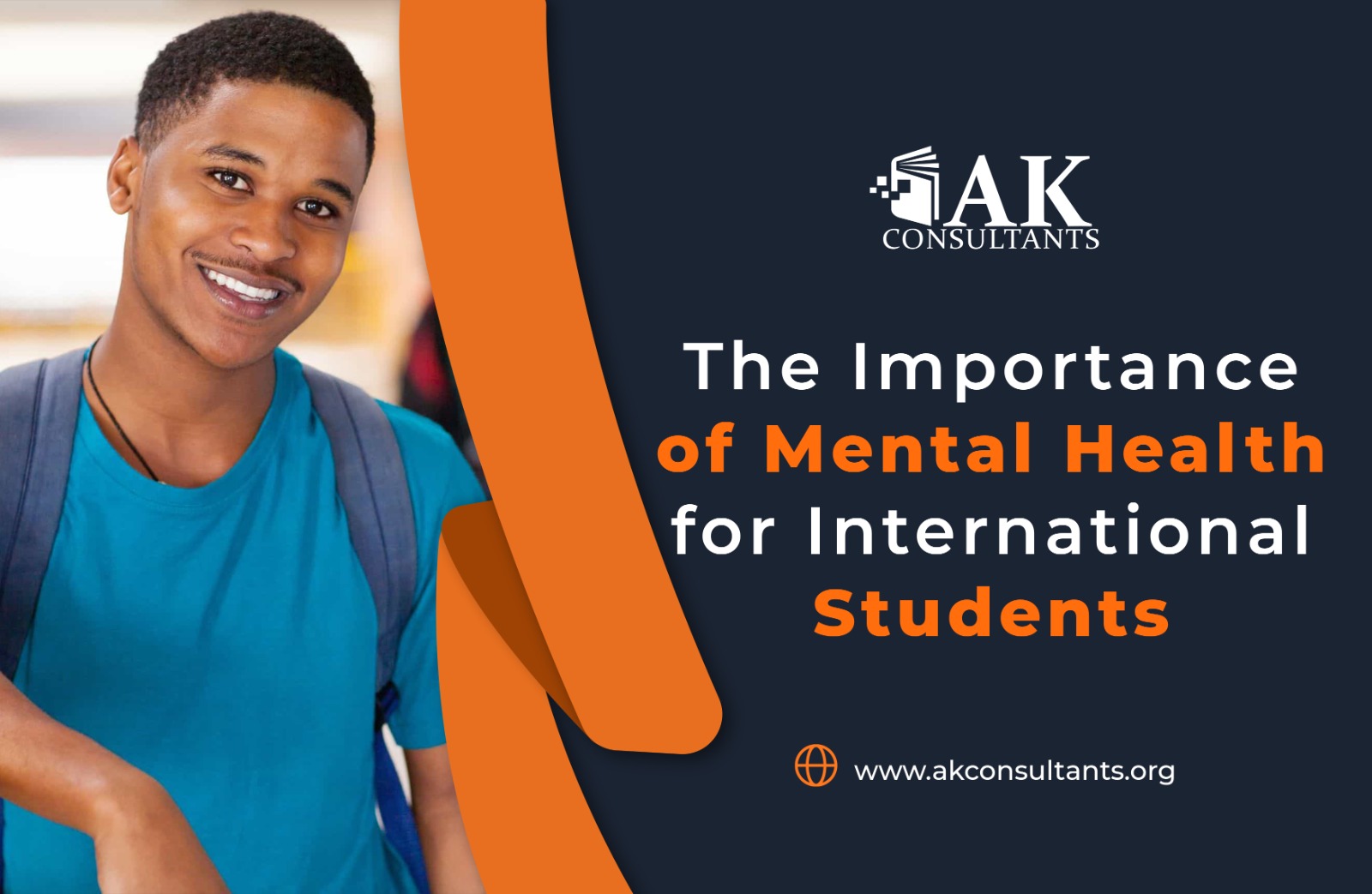Introduction
The increase in mental health concerns among young individuals, worldwide, has garnered substantial attention in recent times. Interestingly, there seems to be a contrast between mental health challenges among the general populace and higher education students. This contrast is natural because students placed in a higher education context face a range of psychological, financial, and socio-cultural problems. Furthermore, when focusing exclusively on international students placed in higher education, the prevalence of mental health issues appears to be more pronounced.
The transition to an academic environment away from home disturbs mental health of international students. In this blog, we will delve into the subject of mental health for international students. This would be done by highlighting common variables affecting the mental health of international students. Afterwards, potential measures that both students and authorities can adopt to provide help would be charted out.
Common Drivers of Mental Health Issues in International Students
Academic Stress
Academic stress and mental health are closely intertwined. The academic pressure faced by international students is a substantial component that causes their poor mental outlook. While academic stress is common among all university students, it appears to affect international students more severely, due to differences in educational systems and teaching styles. The disparity in educational services provided could lead to unfulfilled expectations on the part of international students, which could trigger depression. Beyond adjusting to new educational practices, these students face the pressures of achieving certain academic standards, to stay enrolled in their program of study.
Moreover, these students often grapple with adjusting to unfamiliar norms, grading practices, and class sizes. For instance, students who prefer writing over speaking can suffer in a class environment wherein considerable importance is attached to verbal class participation. No matter how much a specific student performs in written components of the course assessment, their grades often get affected negatively.
If only this was not enough, the pressure on international students, particularly Asian students, is further aggravated by the necessity to honour their families’ investment in their education. Hence, if one is not able to perform in his/her studies, students feel guilt and shame. It leads to the deteriorating mental health of international students.
Academic Pressure and Performance Anxiety
As aforementioned, pressure to perform gets multiplied when a student is studying overseas—it particularly holds true for such students as have been top scorers in their past academic endeavours. Having said that, when a bright student is not able to accustom himself/herself to the new learning environment, the chances of self-doubt oftentimes get high.
Academic pressure can thus hinder students’ ability to be physically and mentally agile; in turn, takes a toll on their self-confidence. This spiral, if not taken into control, can inhibit students’ long-term performance. Alarmingly, according to the ‘American College Health Association’, in the spring of 2015, about 25% of undergraduate students studying in America reported suffering from international student mental health issues.
Wide Cultural Gaps and Socio-Cultural Adaptation
Culture is defined by the set of values and appropriate conduct a specific human society defines for itself. Considering the vastness of the globe, what emerges as culture varies from place to place. Contrary to the argument proposed by ‘globalists’ that the world has become a ‘global village’; wherein, individual values do not matter, the reality is quite on the opposite side.
Cultures that had been claimed as being subsumed are now coming to the forefront once again. In such a scenario, international students often need to be very cautious; for, what may be appropriate conduct for one individual could constitute a serious breach of another individual’s cultural values. Cultural values are especially paramount for such individuals who have limited international exposure. These values are seldom negotiable for them.
International students frequently encounter these difficulties in comprehending social norms and relationships in the host country. This issue becomes especially evident when even well-intentioned gestures are often misconstrued, leading to misunderstandings and misinterpretations. This phenomenon has been observed in the realm of friendships and romantic relationships as well, particularly between individuals from societies with differing gender dynamics. Such miscommunications and misunderstandings might add to feelings of isolation, confusion, and emotional strain. All in all, cultural adaptation and mental wellbeing are co-related. Moreover, cultural ambiguities generate conflict, which if not managed properly, can result in unbearable consequences for all the parties involved.
Adequate mastery of a new language, including its subtle meanings and accent, requires a lot of time. These skills, however, can be polished by spending more and more time in the new cultural setting.
‘Acculturation’ is a concept that is occasionally employed to study how people adapt to new social and cultural surroundings. It can be described as the slow process through which individuals gradually embrace various aspects of a foreign culture. Acculturative stress can lead to depression, particularly for non-European students studying in Europe, because of significant cultural disparities. Nonetheless, research suggests that with prolonged exposure to a new culture, the level of acculturative stress tends to diminish.
Isolation
Isolation is a prominent challenge for international students, exacerbated by differences in notions of privacy and the absence of familiar support networks. The notion of privacy in the West is centred around individualism; whereas, Asiatic regions harbour deep-rooted collectivistic notions of privacy. When confronted with this problem, the mental health of international students may get disturbed, often associated with a lack of consistent companionship. For, individuals in less collectivistic cultures tend to focus more on themselves instead of fulfilling their communitarian duties.
Consequently, most international students find themselves primarily interacting within their own national groups, seeking comfort in familiar cultural contexts. This attitude can, however, thwart their ability to socialise in heterogeneous cultural settings. Overall, this leads to poor social decisions and considerably less enriching stay abroad, stemming from isolation.
Since international education is all about opening to new cultures, embracing new ideas and fostering lifelong friendships, reluctance to intermingle with ‘others’ fades away the very spirit it is based upon.
Homesickness
Homesickness, characterized by longing for a familial environment, significantly affects the mental health of international students. Unsurprisingly, 30% of international students often experience homesickness. The separation from home and family members adversely affects their academic performance, living conditions, and overall psychological state. Homesickness is particularly pronounced among newly enrolled international students and can impede their ability to concentrate on their studies.
Homesickness, if coupled with financial constraints—oftentimes considerable— can seriously hamper international students’ ability to focus on their degree programs. If not addressed properly, homesickness can get nightmarish for such international students who lack the resources to afford a trip back home.
Financial Stress and Independence
Not everyone studying overseas has a very solid financial base to rely upon. Some international students fund their studies by working part-time, whereas, some of them land into their degree programs after selling valuable possessions back home. Therefore, when managing finances for tuition fees, accommodation, and travel, international students have to make sacrifices. Such sacrifices can come in the form of not spending adequately on nutritious food; and, in the extreme case, cutting down on the number of meals per day. With an inadequate food intake, apart from the obvious physical loss, such international students’ mental health is bound to suffer.
Independence is another aspect that holds weight when studying abroad. Independence here can be understood both in financial and spatial terms. As to the financial part, international students’ independence is seriously impacted if they get burdened by student loans. Moreover, international students, occasionally, borrow hefty sums from their friends and acquaintances. This entraps them; because, managing studies while working at the same time, to pay off the debt(s), psychologically drains them.
Unique Crisis Situations
International students are not immune to unforeseen occurrences. Be it pandemics, natural disasters, or conflicts, international students always face unmatched challenges.
The world is witness to the havoc the COVID-19 pandemic wrecked on it. International students, without exaggeration, were most hit by this pandemic. Long quarantines and lockdowns meant that students could no longer undertake part-time work to fund their stay abroad. Add to this the mental misery perpetrated by sitting all day long in the dormitory and a perfect recipe for psychological damage is created.
As to the natural disasters and conflicts, 2023 has been a specifically cumbersome year for international students. With wildfires and climate-induced floods wiping out entire towns, students studying in as diverse locations as North America, Oceania, and Asia have suffered. Add to this the trend of violent conflicts that slow down economic growth, usher in political instability and create a massive number of displaced people. Unsure about their future, the additional burden of being away from home during such crises compound the mental strain experienced by international students.
Why Should International Students Prioritize Their Mental Health
After having discussed the factors associated with the stress international students face, a question arises: Why in the first place is the mental health of international students important?
Maintaining good mental health is vital for optimal academic performance and personal growth. Moreover, mental well-being directly influences cognitive abilities, concentration, and information retention, essential components of successful learning.
Notwithstanding the fact that mental health is the key to overall well-being, some students deliberately hide their psychological problems. While some may do it out of fear of being perceived as weak others feel an obligation to maintain their cultural ethos wherein the concept of mental health does not exist. Having said that, untreated mental health problems keep complementing each other to the point that the student is no longer able to carry out his/her basic daily activities. So, the solution lies in speaking up.
How Should International Students Prioritize Their Mental Health?
Below, therefore, are multiple strategies for ensuring a good mental state and what needs to be done interms of mental health support for international students.
Access to Mental Health Resources
For international students, the foremost step towards ensuring a stable mental condition is the need to acknowledge the fact that humans can and do face mental health challenges. When this realisation has been made, there are various remedial options in place. Having said that, addressing the mental health concerns of international students becomes easy.
- Whenever confronted with a mental health problem international students can reach out to on-campus psychotherapists.
- International students should open-up to their fellows and should seek support from their teachers whom they have a cordial bond with.
- Off-campus professional support is always an open option for students facing psychological duress.
Self-care and Well-Being Strategies
To remain physically and psychologically agile, international students must cultivate a strict self-care routine which includes but is not limited to:
- Balanced diet
- Regular exercise
- Positive bonds with local communities and fellow students
- Abstinence from substance and alcohol abuse when and if things get hard.
- Meditation and yoga
Conclusion
International student mental health issues are often overlooked by students and the general public alike. However, owing to advancements in technology, many international students are now coming to terms with this problem. Due to a plethora of problems, socio-cultural, financial, and relational, a large ratio of international students do face some type of mental health problem(s). The common perpetrators behind a disturbed state of mind include academic stress, problems with socio-cultural adaptation, isolation, homesickness, financial stress, and unique crisis situations.
No matter how poor international students’ mental health condition(s) may be, the pathways to aid are always open. On one hand, international students can foster a strict self-care routine that includes meditation, abstinence from substance abuse, a balanced diet, exercise, and positive bonds with others. On the other hand, students can always reach out to their fellows, because peer support for foreign students is helpful. Additionally, opening up to college professors, on-campus psycho-therapists, and professionals, when things get hard, is also valuable.
Nobody has ever been perfect, and it is entirely normal to feel psychologically distressed at times. Instead of feeling guilt, then, for what humans occasionally do feel, one must think positively; because; being positive does help.


